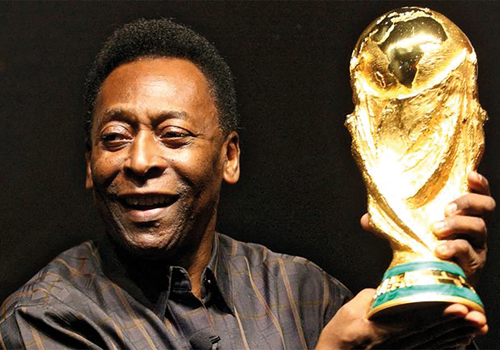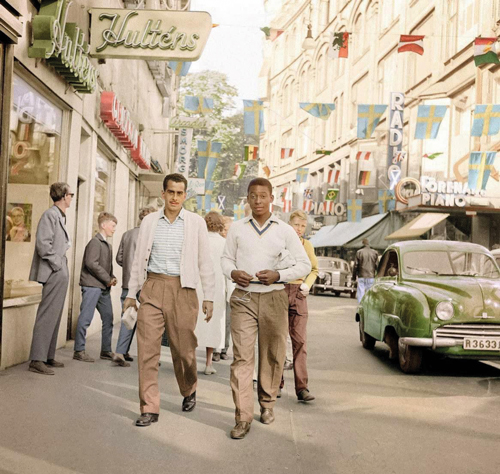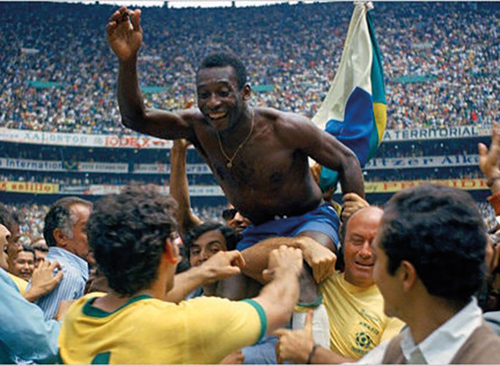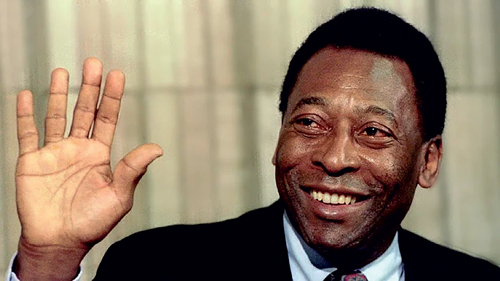Transcending the Beautiful Game: REMEMBERING
02/16/23, Edson Arantes Do Nascimento

Pele and Brazil won the Jules Rimet
Trophy (now FIFA World Cup Trophy)
three times
Edson Arantes Do Nascimento, King Pele, may have waved goodbye to the world, his football and sports legacies would remain forever. Africa Today's contributing editor Idorenyin Uyoe, pays tribute to the greatest footballer the world has ever seen.
Very few outside his native Brazil knew his real name, yet simultaneously, his name would become the most recognisable in the world. Edson Arantes Do Nascimento, better known as Pelé, changed the game of football forever, and in the process, became one of the most transcendent figures in sports history. The World's first global superstar of any colour, Pelé flowed seamlessly in the realms of leisure, diplomacy, popular culture, and entertainment. When the football legend died at the Albert Einstein Israelite hospital in Sao Paolo Brazil on December 29, 2022, (at the age of 82), he bequeathed a legacy unrivaled on the field of play, changing the beautiful game forever. The debate about the greatest player of all time continues to rage, but one fact is undisputable. King Pelé of Brazil was the most significant footballer to ever take the pitch, both for his play on it, and its greatest ambassador off it.
Born in the town of Três Corações, in the state of Minas Gerais, Brazil on October 23, 1940, his parents named him Edson after the American inventor Thomas Edison, as electricity had just been introduced into his hometown. The star recounts the story of how at the age of nine, his father (João Ramos do Nascimento) also a professional footballer nicknamed Dondinho, broke down and cried following Brazil's 2-1 loss to Uruguay on home soil in the final of the 1950 World Cup. He promised his father he would one day win the World Cup for Brazil, and bring it home, and he did just that, eight years later in Sweden.
The 1958 World Cup was held in Sweden, and it was the first to be televised around the world. The impact of the cultural ascendency of the Brazilian team at that tournament is inextricably linked to its biggest star. For starters, Brazil integrated the World Cup by bringing 4 black players to the tournament, including Pelé, for the first time in Europe. At the time, FIFA, the governing body of global football, only accepted membership from independent nations, which meant most of the countries in sub-Saharan Africa, still under colonial rule were excluded from the tournament. Many of these African nations would not gain independence until the 1960s and 70s and as a result, black players at the FIFA World Cup often represented their colonial masters. Take the case of the Portuguese legend Eusebio. At the 1966 World Cup, Eusebio, winner of the golden boot as the tournament's most outstanding player, was actually from the southeast African nation of Mozambique, a country whose independence was still a decade away. The Brazilian team ushered in the era of diversity to the World Cup, and consequently, attracted substantial new fan base from parts of the world who looked like the Brazilian players.

A 17 year old Pele in Sweden at the 1958
World Cup. CREDIT Pele's Twitter
Account
Second, Pelé, at the age of 17 years and 239 days, became the youngest player at the time, to score in the FIFA World Cup, when he netted Brazil's only goal against Wales to send Brazil to the semifinals. Pelé and Brazil went on to win its first of five World Cups titles, when they defeated host nation Sweden in the final. To date, it is the only time a non-European team has won the World Cup in Europe. The myth of the young black boy from Brazil was over, but the legend of Pelé had just begun.
When considering national treasures, certain images come to mind. The Eiffel Tower in Paris, the Statue of Liberty in the United States, and the Great Wall of China, among others -and in Brazil, there was, well, Pelé. Following his sensational performance in Sweden, the world's biggest clubs - Inter Milan, Manchester United, Juventus and Real Madrid - among others, made serious inquiries with his Brazilian club side Santos, about a possible transfer to Europe. In a 2005 interview with FourFourTwo Magazine, Pelé revealed that Juventus Chairman Gianni Agnelli had personally offered him a stake in Fiat to join the club. Though Santos and Pelé rebuffed the offers at the time, the Brazilian government would not be taking any chances. In 1961, President Jânio Quadros, feared a departure for Europe by the hugely popular Pelé would effectively end his Presidency. He initiated a bill, which was quickly passed into law, declaring Pelé a national asset. This meant Pelé, in a twist of irony, was confined to playing in Brazil for Brazilian clubs, restricting him from considering more lucrative offers from much larger, well-resourced European clubs. There are some that question the wisdom and motivation for the law, but as it were, Pelé himself would say over the years, that leaving his Santos football club never crossed his mind. In 1975, Pelé would sign with the New York Cosmos of the defunct North American Soccer League, though it was four years after retiring from the Brazilian national team. The question of fairness still lingers, for which we may never have an answer.

Serial World Cup winner carried aloft
after another victory
In 1970, Brazil would win its third world cup in four editions (they repeated as champions in 1962), making Pelé the first, and only three-time winner in history. But just as noteworthy, is the impact Pelé had on elevating FIFA to unprecedented levels. As an organisation, FIFA currently has more affiliated member countries (205), than the United Nations (193), and quite frankly, offers a much more powerful platform. Consider this. A few days before the final match of the 2022 FIFA World Cup in Qatar, Ukrainian President Vladimir Zelensky requested FIFA allow him to make a televised speech in support for his country's war efforts against Russia. Though FIFA quietly turned down the request, Zelensky understood the power of the FIFA platform to deliver a global audience of 4 billion people listening to his plea. The only other platform that can approach that size of global viewership is the opening ceremonies of the Olympic games. Nothing else comes close.
To be clear, Pelé' is not singularly responsible for FIFA's subsequent growth, however, his grace on the field, combined with his global appeal in even the most remote of villages in the world, calcified its foundation as a global institution, and some would argue, on par with the United Nations.

Goodbye Pele
When Pelé traveled outside his country, he would, by default, be automatically granted an audience with that country's President, Prime Minister, King, or Queen if he wanted it - and the privilege to host him would absolutely be there's. Such was the power, reach and respectability of the Pelé brand. In 2014, an American based investment banking firm appraised the brand marketing value of the name "Pelé", at $3 Million (USD).
Yet beyond the glory, there were issues. His accolades on the pitch have been well chronicled, but so too were his struggles off it. Allegations of extra marital affairs and unacknowledged children (Pelé had seven known kids with four women), would continue to dog him forever. It was reported that his son, Edinho, was sentenced to 33 years in 2014 for money laundering and drug trafficking, though later reduced to 12 years and 10 months, which he is currently serving at home with minimal supervision. These frailties exposed an all too human side of a man who spent seven decades in the public glare, and like anyone else, was clearly not infallible.
Which brings us back to the debate of the greatest footballer of all time. Pelé himself has never backed away from that crown, and in fact, had boldly claimed it. Others may argue the more nuanced and subjective nature of that conversation.
The numbers rarely lie. Pelé holds the record for most goals scored in a career, with 1,279. The man had 92 hat tricks to his name. He is the only man to win three World Cups, and the youngest player to ever score in one. He literally invented the bicycle kick and scored eight goals in his career using it. In 1980, the French Magazine l'equipe named him athlete of the century. In 1999, the International Olympic Committee also named Pelé athlete of the Century, despite his never being an Olympian. In 1997, the British Monarch, late Queen Elizabeth II, honoured Pelé with an honourary Knighthood. He set the standard for the No.10 shirt for those after him, now reserved for any team's best striker or player. He was named player of the century by FIFA in the year 2000. The BBC named him as the second most significant sports person of the century, behind only Muhammad Ali. And the list goes on.
Is there still a debate for the greatest footballer of all time? I suppose there always will be, but history seems to have rendered a verdict that is neither opaque nor ambiguous. There was none better nor more impactful, on the field or off it, than Edson Arantes Do Nascimento. Rest in Peace King.
*Idy Uyoe, who wrote this tribute for Africa Today, is one of our Contributing Editors. He is a Media and Marketing Consultant at Idy Sports + Entertainment, based in Atlanta, Georgia. Idy has written extensively about global sports such as the FIFA World Cup, and the Olympic Games, and has provided strategic Consulting Services for the International Olympic Committee. For sports marketing and media inquiries, you can reach Idy by email at idy@idysports.com. You may also follow him on Twitter @idysports.
Comment on this story



